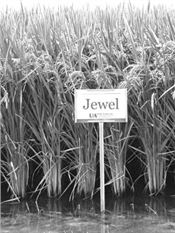New Arkansas Long-Grain Rice Variety Offers High Yields, Resistance To Most Blast Races

Jewel, a new mid-season, long-grain rice variety from the University of Arkansas System
Division of Agriculture, offers high yields and resistance to most known blast races.
U of A System Division of Agriculture photo by Karen Moldenhauer
STUTTGART, ARK.
Jewel, a new mid-season, long-grain rice variety from the University of Arkansas System Division of Agriculture, offers high yields and resistance to most known blast races.
In 14 Arkansas Rice Performance Trials conducted over three years, Jewel averaged 187 bushels per acre, said Karen Moldenhauer, professor and rice breeder for the Arkansas Agricultural Experiment Station, the research arm of the Division of Agriculture. In Uniform Regional Rice Nursery trials in Arkansas during that same period, Jewel yielded an average of 229 bushels per acre.
Those yields compare favorably to LaKast and Roy J rice varieties, and in some cases even with the high-yielding Diamond rice variety, she said.
Maturing about three to four days earlier than Roy J, Jewel reaches 50 percent heading in 87 days, Moldenhauer said. Jewel stands about 37 inches tall and has straw strength similar to Diamond and approaching Roy J, indicating lodging resistance.
Moldenhauer said Jewel has excellent milling yields of 59 percent whole kernels and 71 percent total milled rice, based on three years of Arkansas Rice Performance Trial data.
Jewel contains the Pi-ta and Pi-ks genes for resistance to most of the common races of blast, Moldenhauer said. It is moderately susceptible to sheath blight as well as bacterial panicle blight, much like Roy J.
Moldenhauer said Jewel has good food quality and cooks up in a manner desired by consumers.
Foundation seed for Jewel will be maintained by the Division of Agriculture’s Foundation Seed Program at the Rice Research and Extension Center near Stuttgart. Certified seed will be available to growers in 2021.
Jewel was developed using Rice Grower Checkoff funds administered by the Arkansas Rice Research and Promotion Board. ∆